- Home
- Richard Matheson
Other Kingdoms Page 2
Other Kingdoms Read online
Page 2
I won’t go into many details here. I’ll save them for later in my story. Correction: my account. All I’ll say, at this point, is “By golly, it was fun!” Minus a few small elements. A thousand rats, for instance. We shot them, pounded them with shovels, et cetera. Not too many, mind. They did warn us of impending bombardment: They vanished beforehand.
Speaking of bombardments—another element I’ll sketch in at this moment. Where we were had been, so I was told, woods and farm fields, which were soon artilleryized (my own word) to a forest of splintered tree trunks.
Shell shock.
Explosions, you see, create a vacuum, and when the air rushes back in, it creates a bit of a stir in the cerebro-spinal fluid, which has a tendency to—how should I put it discreetly?—make a fellow grumpy. No problem. Grumpy doughboys were removed from the line and treated, with gentle loving care, at one of the many glamorous resorts in the Gallic countryside. That may be an exaggeration. It is. Bleeding from the ears and shrieking with pain, they were removed from the lines and probably never seen again.
Now I’m giving you details. Sorry. One more. Dawn attacks by representatives of the Triple Alliance—Germany, Austria-Hungary, Luxembourg. They were admirable opponents, since they had been preparing for nine years before the rest of us. Been discussing it since 1888.
No more grisly details until later. You Arthur Black fans, hold on—you’ll have your demented appetites whetted, I assure you. For now, I will confine myself to more technical information. (You Arthur Black fans may choose to skip the next section. Though, if you do, I will summon forth the Great God Horribilis to suck the marrow from your bones. So there.)
Moving onward. Life in the trenches was not really fun, by golly! Less than fun. Two million of us went to France. Fewer than two hundred thousand came back. Does that give you a hint? It took a long time for me to escape the distress of memories.
The trench I lived in was five feet deep with three more feet of sandbags. I am glad it was a French-British trench. I was told that the American trenches were only four feet deep, which could scarcely prevent one’s head from being blown off. We had a fire step, which allowed the bravest of us to fire at the Huns or hurl hand grenades. We were good at that because of baseball experience. Strike three, good-bye, Mr. Kraut! At least that was my Arthur Black fancy.
The Brits, knowing better, placed proper emphasis on trench life. Hand grenades, machine guns, and mortars were more their style. Plus, warnings about the Germans’ proclivity toward same. Good for them. If it weren’t for their cautioning words, you could be looking at a collection of blank pages. MIDNIGHT NOTHING by Arthur Black.
* * *
Walking past Harold Lightfoot that afternoon changed my entire life.
I say “walking.” It was closer to slogging, the trench floor being three inches deep in mud. Sunday afternoon. Either the Germans were observing the Sabbath or they were temporarily out of ammunition.
At any rate, I splashed brown viscous goo across the legs and lap of the young man, sitting, unnoticed by me, cleaning some kind of weapon. I say “some kind” because, following its mud immersion, there was no way to distinguish what kind of weapon it was except that it was as long as a rifle and disgustingly splattered. “’Ey you BF, mind your step!” were the rotund young man’s opening words to me.
“I’m sorry,” was my immediate response.
“Well, you should ruddy well be,” he charged. “Cleaning this shotgun isn’t all beer and skittles, y’know!”
I needed subtitles on that one. “Shotgun?” I ventured. In a French trench? By a British soldier?
“Yes, shotgun!” he snapped at me. “That blow you up?!”
“No, I—” I was lost in the language again. All I could do was repeat (with an extra word), “I’m so sorry.” I tried to smile as best I could. “I didn’t realize…” I pointed toward the trench floor. “The mud. It’s so deep.”
My renewed apology—and, I assume, my smile—did the trick, broke the ice, assuaged the injured party, whoever he was. “Well, all right,” he said. He smiled back, the sweetest smile I’d ever seen since Veronica’s. It charmed me. I put out my hand. “Alex White,” I told him.
He held out his hand. The smallest hand I’d ever seen since Veronica’s. But strong. His grip was steel. “Harold Lightfoot,” he said. I almost laughed but managed not to. Lightfoot? The strangest name I’d ever heard since—since what? Captain Bradford Smith White, USN? No, Dad was the strangest person. Almost. Hang on.
“So where you off to, Alex?” he inquired. “Perambulating? Catching the sights?”
I laughed, a little. He also spoke a language I understood? “No,” I said. “Just stretching my legs, I guess.”
“It is quiet,” he said, as though he understood my comment.
I decided that he must have. “The Germans must be praying,” I said.
He chuckled. “That could be,” he agreed. “But praying for what?”
“Our destruction, of course,” I answered.
He chuckled again, more volubly. “That’s for flaming sure,” he said. He sniffed aside and gestured toward the wooden soup-supply box he was sitting on. “Care to join me, Whitehead?”
“White,” I corrected. “Thank you.” I sat next to him on the box. “Very generous of you.”
“Oh, bollocks to that,” he said. Language again. (I smiled—wanly—as though I “got” that, too.) “I could use a little company. Don’t know a bleedin’ word of French. And the Tommies are KBB.” Seeing my face, he added, “Sorry. KBB means ‘King’s bad bargain.’ Rotten soldiers. Got it?”
“Got it,” I said, smiling.
That returned smile again. Utterly charming. “Glad t’hear it,” he said.
“And BF?” I inquired.
He looked embarrassed. “Out of turn,” he said.
“Means … bloody fool?” I guessed.
“Something like that, Whitehead,” he confessed.
“White.”
“Oh, yes. Mistake again.” That smile. It would likely bring on forgiveness for a capital crime.
Before continuing, let me (partially) explain my opening comment to my introduction of Harold Lightfoot, that he changed my entire life. He did. Mostly for the better. Not entirely, though, as you will—to quote Arthur Black—“presently discover, hopefully to your edification, more likely to your—” Well, let that go. I don’t want to spook you so soon. Let’s just say that, yes, most definitely, Harold Lightfoot changed my life.
* * *
“You’re a Yank,” said Harold Lightfoot. “From where?”
I told him Brooklyn, New York, and he immediately launched into a detailed lecture, informing me that, of course, it was a well-known fact that England had a city named York. The “new” world being established exclusively by English immigrants (according to Harold), they named that city New York (emphasis his), followed by a conversion of Jersey into New Jersey, Hampshire into New Hampshire, and the whole kaboodle into New England.
He was just completing his lecture when the Germans, having either completed Sabbath service or received a new shipment of ammunition, deposited a few dozen mortar shells on our trenches, several of which fell on our particular spot. Opting for caution rather than probable dismemberment, Harold Lightfoot (his rapid movement verifying his family name) and I retired posthaste to what we called “the cave” at the rear of the trench, where we slept, cooked our gourmet slumgullion—a stew made of “monkey meat” (bad beef) and any other edible lying around that wasn’t deadly poison—ate our hardtack—appropriately named—slept, and dreamed our pointless dreams. There, Harold Lightfoot and I cowered while the world exploded around us.
Chapter Four
From there on, my friendship with Harold Lightfoot consisted of (1) language interpretation and (2) general military information. A smattering of same below.
One:
a. “And pigs might fly!” meant “Yeah sure!” (Sarcasm.)
b. “As near as dam
mit” meant “That was close.” (Used quite often with nearby landing mortar shells.)
c. “As easy as kiss your hand” meant “Easy as pie.”
Two:
a. We were “relieved” of our 1903 model Springfield, .30-caliber rifle with a Mauser action. Replacing it was the P17 short magazine Lee-Einfield, .30.06 caliber rifle. (How Harold remembered all those details still puzzles me.)
b. Hand grenades are activated as follows: (1) Pull out the “spoon” (the metal lever). (1a) Hold in the spoon until prepared to— (2) Throw the grenade (preferably at the enemy), which will explode, hurtling grenade fragments eighty feet. (Step 1a was essential, Harold emphasized.)
c. Bayonets? Forget it. A rifle with a bayonet attached would be overweighted. And .45-caliber handguns? Officers and senior noncoms only. Shotguns? I asked Harold about his. He told me he had gotten it in a trade. The shotgun was called a “trench broom.” (Think about it.) The Germans objected to it. It violated the “rules of war.” I often wondered what kind of strange person devised those “rules,” which should have been “stay home and leave well enough alone.”
d. Watch out for “lingering gas” in shell holes. Arsenic poisoning was a by-product of gas-grenade explosions. Lyelike, it devoured the testicles of any man taking refuge in that particular shell hole. Not to mention facial disfigurement.
e. Stay away from brothels. Syphilis and gonorrhea (spelling? never could get them right) might detract from your soldiering skills.
f. Forget about what the army taught you about camouflage. In a trench?
* * *
Harold mentioned Gatford one cloudy afternoon prior to another land attack. He was feeling fatalistic, I imagine. Perhaps not. At any rate, he mentioned Gatford, starting with, “I wonder if I’ll ever make it home.”
“Where’s home?” I asked.
“Gatford,” he replied.
“Where’s that?” I asked.
“Town in Northern England,” Harold told me.
“Nice?”
“Gorgeous,” Harold said. He’d never used that word before. No, once. In reference to the extreme size of a certain female’s breasts. But this was more soulful.
“You miss it, then,” I said.
“Who wouldn’t? It’s gorgeous.” Twice now. I gathered that he cared for the place.
“Gatford,” I said.
“Gatford,” he repeated.
“And you think it’s gorgeous.”
Harold frowned. “You makin’ fun of me?” he said.
“No, not at all,” I answered, feeling guilty that he thought so. “I’d never say Brooklyn is gorgeous.”
“Awright,” said Harold, with that smile. I admired that smile.
“Tell me about it,” I said.
Gatford, as he told me, was in the northern part of England, thirty or so miles southeast of—no, I don’t believe I’ll tell you where it is. It’s possible you’d think of going there, and that would be a bad idea—for a number of reasons I’ll enumerate presently. For now, let it be that Gatford is thirty or so miles southeast of______. And don’t think that knowing its name will make it that much easier to locate it. Not so. If Harold hadn’t given me precise instructions, I’d have never found it. Nor would you. And Harold is gone.
What was so gorgeous about Gatford? Harold had little success in telling me. All he could repeat was “gorgeous.” The gardens, the cottages, the shops, the—well, the entire countryside, all “gorgeous” (if a little “different”). That, he never explained. So I got scant specific information about Harold Lightfoot’s hometown except that—as he kept reiterating—it was “gorgeous.” For a short while, before common sense intervened, I had the sensation that Gatford had somehow mesmerized him into describing it with a single word. Then I dropped the feeling. Captain Bradford Smith White, USN, had rooted out all fancy thinking from my psyche. God, how that changed! As you will discover, hopefully to your edification, more likely to your— Well, you’ve heard that before. Arthur Black style.
Anyway, Gatford established itself in my mind as some unidentified gorgeousness in Northern England. At the time, the lack of determinate location didn’t matter to me, since I had no intention of immigrating there.
* * *
And so as the weeks went by, my friendship with Harold Lightfoot increased steadily.
The afternoon he got killed, we were discussing—spacing our conversation with hasty retreats to the nearest cave enclosure to avoid the dire effects of exploding mortar shells—the subject of shotgun utilization. This time, my curiosity was not directed toward the effects of a shotgun “burst.” I’d seen them, been nauseated by the sight, and understood them implicitly. Instead, my prying had to do with trading procedure. Who did Harold get the shotgun from? How did he pay for it?
Harold chose not to reveal the identity of the trench merchant. Not a good idea, he pointed out. If word got out who the merchant was, he could get arrested and, conceivably, courtmartialed. It made no matter to me. I was interested only in method of payment. Money? I didn’t think Tommies made that much. Unless they were higher ranked. Barter? For what?
Which was when Harold, maybe uncomfortable with the withholding of the shotgun source’s name, revealed to me what he’d used to trade for the weapon in question. Gold, he said.
“Where did you get gold?” I asked him.
“Sent to me,” he said.
“By who?” I asked. Is it whom? I never knew.
He hesitated. Why? I wondered. Was there crime involved?
It was as though he read my mind. “I didn’t steal it, Alex,” he said.
“So?…” It still sounded mysterious to me.
“My family sent it to me,” he said after another noticeable hesitation.
“No kidding,” I said, impressed. Now I was merely curious, no longer suspicious. “They own a gold mine?”
“No.” He laughed now, off the hook. “They just—” Another hesitation—as though he was proceeding too far again. “—they know where to get it,” he told me.
Which is where? I thought. I decided not to press him any further on that. “What, coins?” I asked.
He laughed again, not forced this time. “No, a lump,” he said.
“A lump,” I said.
He nodded, smiling. “How big a lump?” I asked.
“As big as your head,” he said, straight faced. I knew he was joshing. I let the subject go. It was really none of my business. I would have liked to find out more, but obviously, Harold did not care to discuss it. Why, I found out later.
It was at that moment that hand grenades began to drop into our segment of the trench. The first exploded almost harmlessly, buried, beneath mud. Before the second one went off, Harold and I were hiding in our portion of the cave.
I should have known what it meant when Harold grunted and twitched beside me. It is no defense on my part to say that I was unaware, I could not conceive that either one of us might die. Not me, not Harold. We were invincible.
We were not, of course. I thought the cessation of grenade rain was the end of problems at that moment. How could I—I should say, why didn’t I know that Harold’s wound was mortal?
The first shocking realization of the truth hit me—hard—when I saw him lying on his back in the trench, a grimace of agony on his round face—teeth clenched and round cheeks taut, eyes almost shut, staring into nothingness. “Harold,” I said. (Was that soprano croak really my voice?) I crawled toward him.
Two of the Tommies tried to sit him up. “No, don’t!” he gasped; I didn’t know why right away. “I’m better this way,” he said. At least I think he said, his voice was virtually unintelligible. “Why?” I remember asking—stupidly, as it turned out. “Because,” he mumbled. Then I think he added, “My insides will fall out.” Whether he really said that has been another lasting curiosity in my life. It was the truth, however. A few minutes later, when a medic tried to roll him over, Harold screamed with pain and I caught a momentary (harrowing) v
iew of his wound. All that was visible were shattered bones and torn-up, bloody intestines. The sight of that remains with me to this day.
Harold spoke my name, and I leaned over him, a constant flow of tears blurring my sight of his face.
How he managed to smile in the midst of all that excruciating pain, I didn’t know then and still don’t know. He did, though. That utterly charming smile. Even with blood trickling on his lips.
“Listen,” he managed to say, “when you go to Gatford…” Go to Gatford? I’d never brought up a suggestion of that. Still, I was not about to contradict him when he was on the pinpoint of life, the razor edge of death. “You are going there,” he said, as though reading my doubt.
“Okay,” I said. I had no intention of doing so. But my friend Harold was about to die. Should I add mental pain to his bodily anguish? Never.
“When you do,” he mumbled; he gestured with his head for me to lean over closer. I did and he whispered, “Take my gold and sell it. Buy a cottage—just avoid the middle—” He broke off, drowning in a deep, liquid breath that filled his mouth with blood. Choking, he began to cough. I tried to call the medic, but his right hand grabbed my sleeve; where he got the strength from is another mystery beyond solution. He drew me down to his blood-soaked lips. “In the bottom of my duffel bag,” he said. The last words of his life—but those perfectly clear.
I had to pry his dead fingers from my sleeve. I cried then, like a baby, not only tears but sobs; I reminded me of Veronica. I labored to my feet, falling twice, and began to stagger off from Harold’s corpse. I realized then—a true measure of the humbling impact of Harold’s death—that the same grenade explosion that had killed my friend had sliced open my right thigh and hip, soaking my trousers with blood. I didn’t faint immediately, but soon after—to regain consciousness in a field hospital. Well, there goes my lump of gold, was the first unkind comment my brain emerged with.

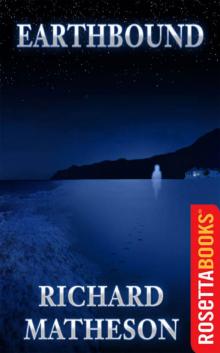 Earthbound
Earthbound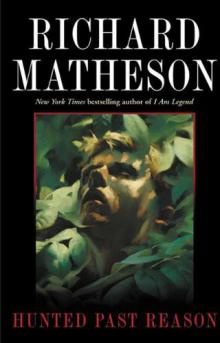 Hunted Past Reason
Hunted Past Reason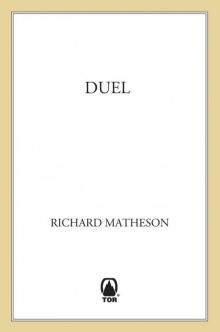 Duel: Terror Stories
Duel: Terror Stories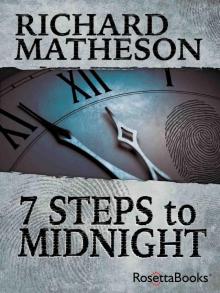 7 Steps to Midnight
7 Steps to Midnight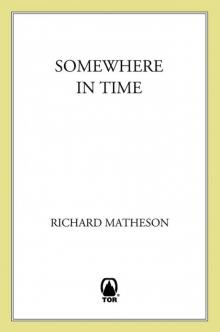 Somewhere in Time
Somewhere in Time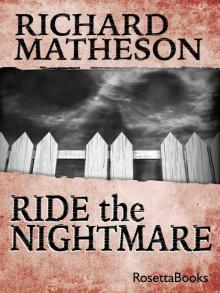 Ride the Nightmare
Ride the Nightmare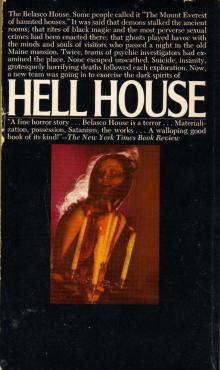 Hell House
Hell House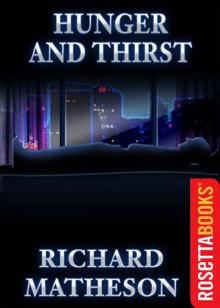 Hunger and Thirst
Hunger and Thirst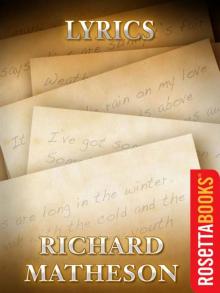 Lyrics
Lyrics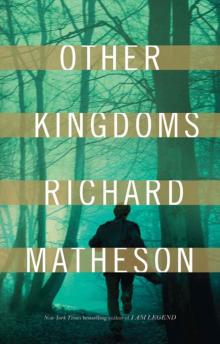 Other Kingdoms
Other Kingdoms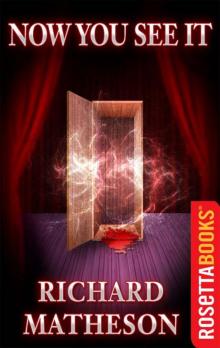 Now You See It . . .
Now You See It . . .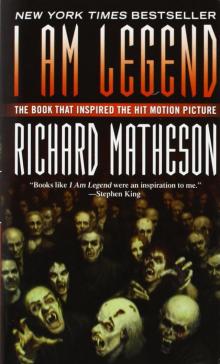 I Am Legend
I Am Legend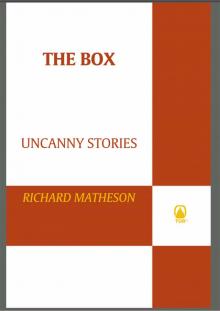 The Box: Uncanny Stories
The Box: Uncanny Stories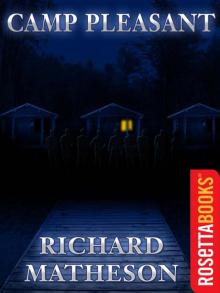 Camp Pleasant
Camp Pleasant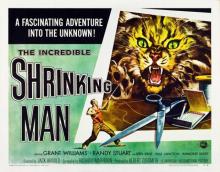 The Incredible Shrinking Man
The Incredible Shrinking Man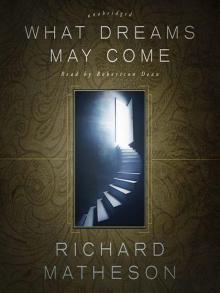 What Dreams May Come
What Dreams May Come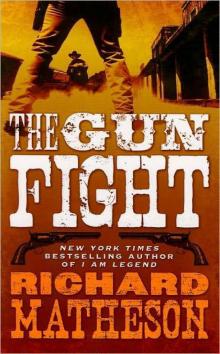 The Gun Fight
The Gun Fight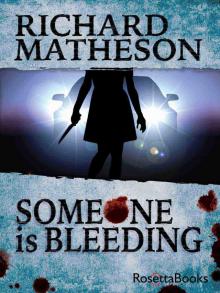 Someone Is Bleeding
Someone Is Bleeding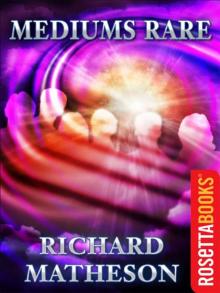 Mediums Rare
Mediums Rare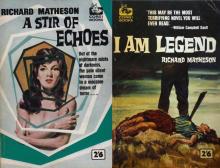 A Stir of Echoes
A Stir of Echoes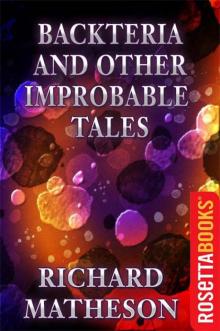 Backteria and Other Improbable Tales
Backteria and Other Improbable Tales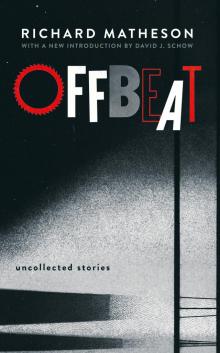 Offbeat: Uncollected Stories
Offbeat: Uncollected Stories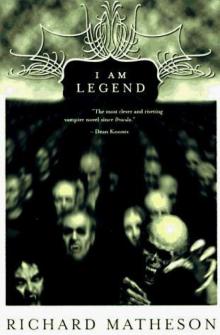 I Am Legend and Other Stories
I Am Legend and Other Stories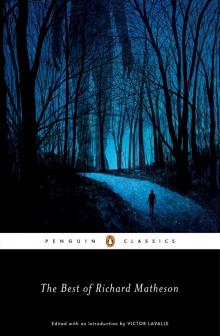 The Best of Richard Matheson
The Best of Richard Matheson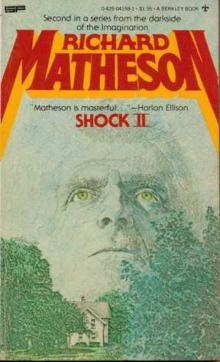 Shock II
Shock II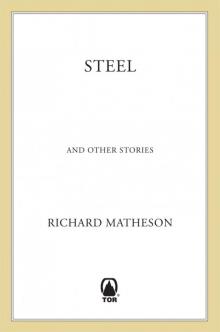 Steel: And Other Stories
Steel: And Other Stories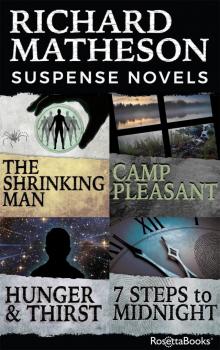 Richard Matheson Suspense Novels
Richard Matheson Suspense Novels The Link
The Link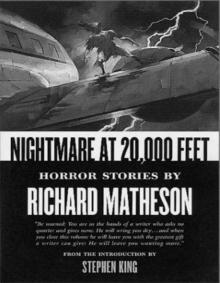 Nightmare At 20,000 Feet
Nightmare At 20,000 Feet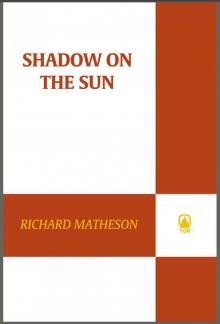 Shadow on the Sun
Shadow on the Sun![Steel and other stories [SSC] Read online](http://i1.bookreadfree.com/i/03/21/steel_and_other_stories_ssc_preview.jpg) Steel and other stories [SSC]
Steel and other stories [SSC]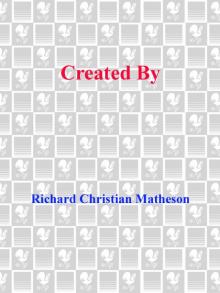 Created By
Created By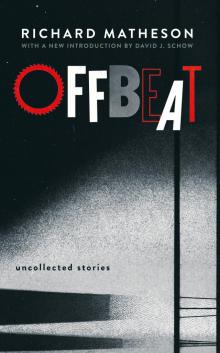 Offbeat
Offbeat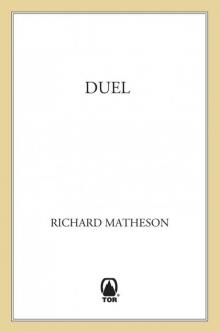 Duel
Duel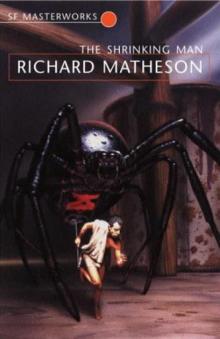 The Shrinking Man
The Shrinking Man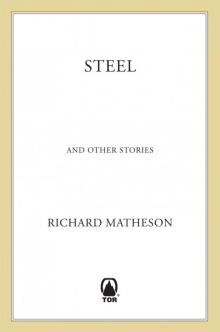 Steel
Steel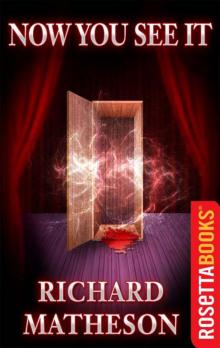 Now You See It
Now You See It